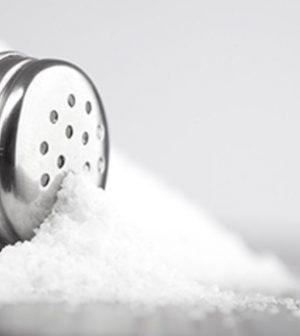- Could Your Grocery Store Meat Be Causing Recurring UTIs?
- Are You Making This Expensive Thermostat Error This Winter?
- Recognizing the Signs of Hypothyroidism
- 10 Strategies to Overcome Insomnia
- Could Artificial Sweeteners Be Aging the Brain Faster?
- Techniques for Soothing Your Nervous System
- Does the Water in Your House Smell Funny? Here’s Why
- Can a Daily Dose of Apple Cider Vinegar Actually Aid Weight Loss?
- 6 Health Beverages That Can Actually Spike Your Blood Sugar
- Treatment Options for Social Anxiety Disorder
High-Salt Diets Might Raise Eczema Risk

Doctors already warn folks off salt due to its heart risks, but new research suggests sodium isn’t helping your skin either.
Researchers found that as daily salt intake rose, so did the odds for the skin disorder eczema, also known as atopic dermatitis.
“Restriction of dietary sodium intake may be a cost-effective and low-risk intervention for atopic dermatitis,” concluded a team led by Dr. Katrina Abuabara, associate professor of dermatology at the University of California, San Francisco (UCSF).
The data came from on an ongoing British research database called the UK Biobank, involving almost 216,000 people aged 37 and older at the time they were recruited into the study.
As part of the Biobank effort, people were asked to provide a urine sample, which could then be used to gauge a person’s sodium intake.
About 5% of the people in the Biobank had a diagnosis of eczema.
The average person’s 24-hour “urine sodium excretion” was about 3 grams, but the study found that folks’ daily excretion of sodium went up by just 1 gram, their odds for a flare-up of their eczema rose by 22%. The effect seemed stronger among women than men.
People whose urine sample suggested high salt intake faced an 11% higher odds of severe eczema, the researchers said.
On the other hand, folks who stuck to health guidelines when it came to limiting salt intake had a 12% lower odds of eczema , the team noted.
The study was published June 5 in the journal JAMA Dermatology.
Abuabara’s team noted that salt’s link to eczema isn’t a new discovery. In fact, “reduced sodium intake was recommended as a treatment for atopic dermatitis more than a century ago,” they wrote in a journal news release.
They stressed that the study wasn’t designed to prove cause-and-effect, and its possible that folks who like salt might be eating other foods that put their skin at risk.
“However, our findings are consistent with literature showing that excess dietary sodium can be stored in the skin,” the researchers wrote.
Sodium has also been cited as playing a role in inflammatory processes that might help drive eczema.
Whatever the reasons driving the link, the researchers say it might not hurt to put that salt shaker down.
“Most Americans eat too much salt and can safely reduce their intake to recommended levels,” Abuabara said in a UCSF news release. “Eczema flares can be difficult for patients to cope with, especially when they are unable to anticipate them and don’t have recommendations on what they can do to avoid them.”
“Our study opens the potential for future studies on restriction of dietary sodium intake as an intervention for atopic dermatitis that would be cost-effective, low risk and widely available,” the research team said.
More information
Find out the current dietary recommendations on salt from the U.S. Food and Drug Administration.
SOURCE: JAMA Dermatology, June 5,2024, UCSF news release
Source: HealthDay
Copyright © 2026 HealthDay. All rights reserved.










